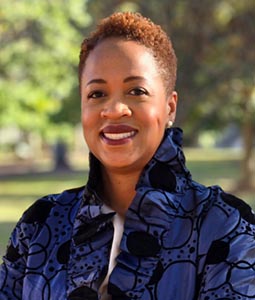College of Education
- SC.edu
- Study
- Colleges and Schools
- Colleges and Schools
- College of Education
- Faculty and Staff
- Michelle Bryan, Ph.D.
Faculty and Staff
Michelle Bryan, Ph.D.
| Title: | Associate Professor, Leadership, Learning Design, and Inquiry Associate Vice President, Office of Access and Opportunity |
| Department: | Office of the Dean College of Education |
| Email: | mbryan@mailbox.sc.edu |

Education
Doctor of Philosophy, Education (Culture, Curriculum & Change) - The University of North Carolina at Chapel Hill, 2006
Master of Arts in Teaching, Secondary Social Sciences - The University of North Carolina at Chapel Hill, 1998
Bachelor of Arts, African American Studies/American History - The University of North Carolina at Chapel Hill, 1996
Research/Areas of Expertise
As a researcher and program evaluator, Michelle employs critical and qualitative methodologies to illuminate the complex interactions between education, identities and power in reproducing marginalization and domination in academic settings and to better understand how those interactions shape the experiences of students, faculty, and administrators of color. Her work has been published in the International Journal of Qualitative Studies in Education, the Journal of Diversity in Higher Education, New Directions for Evaluation, and Urban Education.
Selected Publications
Cook, D., & Bryan, M. (2023) Speak truth! The role of black women’s dialogue in the production of scholarship. Qualitative Research Journal, 0(0). https://doi.org/10.1177/14687941231206739
Von Esch, K. A., & Bryan, M. (2022). Introduction to special issue: 10th International Conference on Education and Social Justice. Professing Education, 20(1), 5-7.
Bryan, M. (2020). Foreword. In T. Jenkins (Ed.), Reshaping graduate education through innovation and experiential learning. Hershey, PA: IGI Global.
Bryan, M. & Lewis, A. (2020). Culturally responsive evaluation as a form of critical qualitative inquiry. In Noblit, G. W. (Ed.). The Oxford Encyclopedia of Qualitative Research Methods in Education. Oxford University Press. Oxford Research Encyclopedia.
Bryan, M., & O’Sullivan, R. (2014). Shaping a new generation of culturally responsive evaluators: Program director perspectives on the role of the internship experience. In P.M. Collins & R. Hopson (Eds.), Building a new generation of culturally responsive evaluators through AEA’s Graduate Education Diversity Internship program. New Directions for Evaluation, 143, 67-81.
Askew, K., Beverly, M., & Jay, M. (2012). Aligning collaborative and culturally responsive evaluation approaches. Evaluation and Program Planning, 35(4), 552-557
Selected Presentations
Bryan, M. (2023). Living into a legacy of excellence. Inaugural address for Oklahoma State University’s Nancy Randolph Davis Day Celebration. Stillwater, OK.
Bryan, M., & Cook, D. (2022). Speak truth! Framing dialogue as an Afrocentric feminist intervention in qualitative research. Paper presented at the American Educational Research Association annual meeting in San Diego, CA.
Bryan, M., & Wyatt, A. (2021). Using data for equity-minded integrated planning. Presentation given for the Society of College and University Planner’s Southern Regional annual conference in Knoxville, TN.
Jenkins, T. & Bryan, M. (2021). Do they see us? A visual call to remember faculty and staff mattering and pandemic life in higher education. Presidential initiative exhibited at the Association for the Study of Higher Education 46th annual conference in San Juan, Puerto Rico.
Lewis, A., Hopson, R., & Bryan, M. (2021) At the intersection of CRE & CRM: Implications for evaluation theory and practice. Paper presented at the 6th annual Center for Culturally Responsive Evaluation and Assessment international conference.